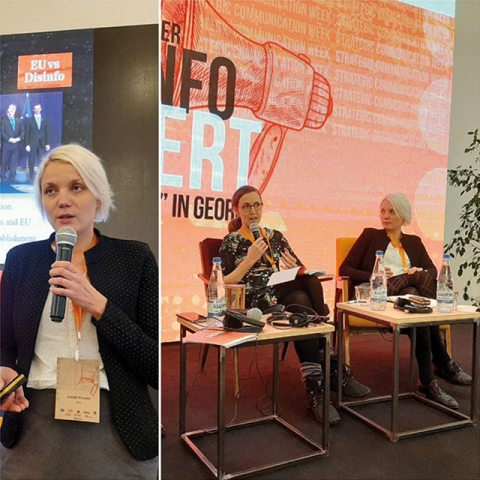East StratCom’s Ahonen on Explaining the EU to Georgians
Interview
The Georgian Institute for Security Policy (GISP) met Anneli Ahonen, Head of the European Union External Action Service’s East StratCom Taskforce, to talk about the strategic communication challenges the EU faces in Georgia and ways to overcome them.
Looking at our region in Georgia, in particular from Brussels, what do you consider your main challenges?
The challenge is that Georgia is tormented by the Kremlin’s disinformation and that makes the problem much tougher to tackle, and there is no easy solution. Our team was set up in 2015 and since then, we have been working together with local community leaders in countries we are trying to assist. So, our team will explain in Georgian, the language that the local community leaders understand, in the ways that Georgian society understands, what the EU is about, what European integration means and what the benefits are.
One of the more vulnerable segments of society, when it comes to disinformation, is the older population, especially in rural areas, many of whom have fond memories of Soviet times. How would you explain to them the benefits of the EU and Europe?
Well, the only way to sell the EU to them is to explain how their community has benefited from such things. What are the main benefits for them, for their family or village. The only way to show this is how the EU has helped to create jobs or some kind of programs for whatever their interests are. There are projects and programs working in the communities on different types of engagement with older people. We need to show them that the EU has built a community center in their village that actually allows them to apply for a passport without having to go to Tbilisi. So, showing very practical things that they can see themselves.
Is there enough of that happening in Georgia?
Not yet, but we are working on it. This is the most difficult and most expensive form of communication: being there, talking to these people. I don’t mean EU people being there, but really the information being there where those people can access it: in the newspaper they read, in their local village hall, in the local church, in all of the places where they go and communicate, this information must be there. Our challenge is getting the information there. Here’s the Estonian example: Take an elderly man in Estonia- he listens to the radio, and believes that whatever the radio says is “true”. So we know that we have to be on the radio, in programs he can relate to. We just have to know where this person is and how we can reach him.
Many among older Georgian society are both religious and conservative. How do you explain the benefits of voting for pro-Western parties to people like that?
Well, I can say how I wouldn’t do it: I wouldn’t go through the values which are very distant for them and very difficult to understand. I would use the tangible things that they recognize and which are somehow related to their life: job creation and showing EU support in local cooperatives coming together, producing something, getting new equipment.
The Russians would waste no time in informing these people that "the eu stands against their traditional values.” How can you counter this?
I would aim to get them to believe that actually the European Union is something that could be valuable somehow to their personal life in Georgia, that it can help them in some way. The other way is what we are doing with the Church, explaining the more difficult concepts of how we work, what it means to rebut the myths of the other side.
How much willingness have you seen from the Church?
A lot. We’ve been at it for three years now. We’ve had substantially better cooperation in terms of study, dialogue and youth projects. We have EU clubs in schools, but so much more needs to be done. Nothing happens overnight. The only key to successful communication is its consistency over the years. You have to do the same thing non-stop, year after year.
By Vazha Tavberidze for GISP
Image source: twitter.com/EUvsDisinfo












